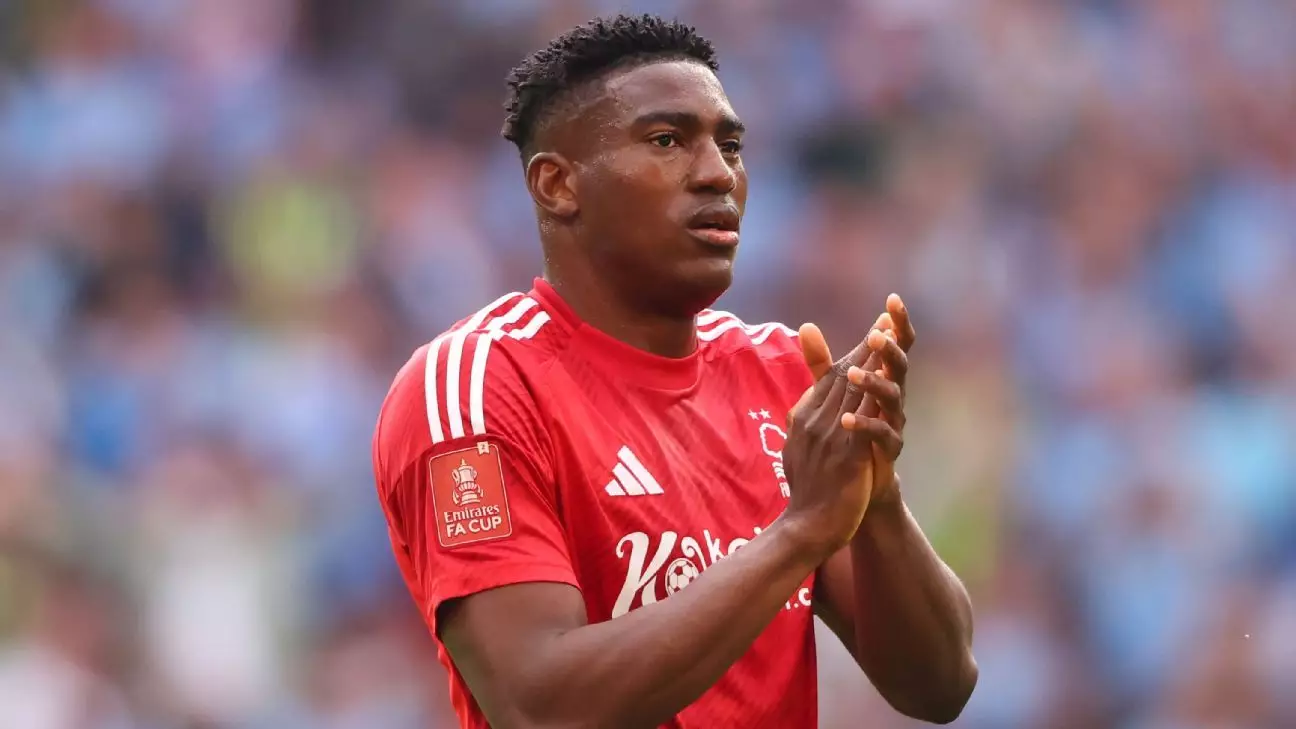The football world held its breath following recent news about Taiwo Awoniyi, Nottingham Forest’s promising striker, who was placed in an induced coma following an alarming abdominal injury. This critical incident unfolded during a lively match against Leicester City—one that finished in a 2-2 draw and saw friction both on and off the field. A fierce collision with the goal frame not only jeopardized Awoniyi’s health but also raised questions about player safety protocols and communication within the club. Injuries in football are not unprecedented, yet Awoniyi’s situation has sparked a larger conversation about how clubs manage similar incidents.
Urgency in Treatment
Awoniyi’s injury led to an “urgent” surgery that left fans and teammates shaken. Initially, the anxiety surrounding the striker’s condition became palpable, reflecting the deep emotional ties fans cultivate with their players. The decision to place Awoniyi in an induced coma aimed to facilitate his recovery by minimizing movement and stabilizing his heart rate, allowing medical professionals to precisely control his treatment. This aspect underscores a need for clubs to prioritize medical protocols and make timely decisions, ensuring player safety is always at the forefront.
While Forest released a statement claiming the striker was “recovering well,” the entire situation amplified concerns about the adequacy of communication between team management and medical staff during crucial match moments. It is a stark reminder that every decision made, from injuries to substitutions, can dramatically alter the trajectory of a game and, indeed, a player’s career.
Aftermath and Leadership Dynamics
In the wake of Awoniyi’s injury, club owner Evangelos Marinakis took matters into his own hands, openly confronting manager Nuno Espirito Santo on the pitch post-match. This event escalated into a heated discussion pertaining to what many viewed as a failure in communication between the coaching and medical teams. Espirito Santo later explained that he was caught off guard when Awoniyi signaled he could continue playing, leading to a situation where our team was left precariously at a numerical disadvantage.
Marinakis’ outburst, an expression of genuine concern, highlighted the emotional investment that club leadership has in their players. His instinctual reaction was one of deep emotional engagement, showcasing that the relationship between club management and players is not merely transactional. The dialogue surrounding Marinakis’ public display of frustration also invites speculation about how owners handle crises and manage team morale, especially in the final critical stages of a season.
Champions League Aspirations Amidst Turbulence
As the dust settles, Nottingham Forest finds itself in a tumultuous push for a Champions League spot, trailing one point behind fifth-placed Chelsea. With only two matches left in the league, the stakes couldn’t be higher. The team must find a way to rally without their star striker, whose absence will undoubtedly be felt both on the pitch and in the locker room.
Moreover, Marinakis’ dual roles as owner of Nottingham Forest and president of Olympiakos brings an additional layer of complexity to the situation. UEFA regulates club ownership rigorously to ensure that no individual wields undue influence over multiple teams competing in the same tournaments. Marinakis has already relinquished some control over Forest during this crucial season. Still, his commitment and emotional attachment, as demonstrated during the Leicester game, place him in a precarious position.
Resilience in the Face of Challenges
This entire episode serves as an embodiment of vulnerability in professional sports. The human aspect of football is often overshadowed by statistics and scores, yet it is precisely these events that forge a deeper connection between players, management, and fans. Awoniyi’s ordeal serves as a reminder of the fragility of athletes and the urgency of prioritizing their welfare above competitive aspirations.
Fans and former players alike will be watching closely, hoping to see the resilient spirit of Nottingham Forest shine through in the face of adversity. Awoniyi’s return is eagerly anticipated, not just as a personal victory for the player but as a testament to the club’s ability to overcome hardship and persevere toward their dreams.


Leave a Reply